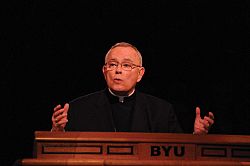Archbishop Chaput: 'Live grounded in faith'
Friday, Apr. 01, 2016

IC photo/Christine Young
+ Enlarge
Archbishop Charles J. Chaput of Philadelphia, who has written two books about living the faith, speaks at Brigham Young University
PROVO — Archbishop Charles J. Chaput, O.F.M. Cap., of Philadelphia, chairman of the U.S. Conference of Catholic Bishop’s Subcommittee on Native American Catholics, spoke at Brigham Young University’s monthly Forum on March 22.
“It was an honor to have Archbishop Chaput at BYU; he is a great man who has great vision for people of faith everywhere,” said Brad Neiger, BYU associate academic vice president. “His remarks were inspiring and uplifting and our campus is better for him being here.”
Among the dignitaries attending the forum were Kevin J. Worthen, president of BYU; and Elder Dallin H. Oaks, a member of the Quorum of the Twelve Apostles of The Church of Jesus Christ of Latter-day Saints.
The archbishop began his remarks by saying a friendship between the LDS and Catholic communities is important. “The better we know each other’s stories as religious minorities in this country, the better we can support each other in pursuing some of the vital issues we share,” he said.
Archbishop Chaput, born in 1944, inherited a spirit of patriotism that shaped the early years of his life, he said. “At its best, America is an exceptional nation, a country built on limited government, the rule of law and economic opportunity.”
The task of religious believers, regardless of their tradition, “is to witness our love for God and for each other in the time and place God puts us,” Archbishop Chaput said. “Six years ago a mentor and friend of mine, Cardinal Francis George came to this campus and spoke about Catholics and Latter-day Saints as partners in the defense of religious freedom; he noted how often LDS and Catholic concerns about marriage, family, poverty, the degrading effects of pornography and the sanctity of the unborn child coincide.
“America is an idea, and the idea needs to have a moral substance greater than every man for himself or do whatever you want, as long as it doesn’t hurt somebody else,” he said.
Humans were created with a body as well as a soul, and “the body has a purpose,” Archbishop Chaput said. “Our sexuality is ordered to creating and raising new life, and to the mutual support of a man and a woman in a covenant of love. No society can sustain itself for long if marriage and the family fall apart on a mass scale. That is exactly what is happening today.”
Every setback and failure bears the seeds of success “if we learn the right lessons from it,” Archbishop Chaput said. “Just as optimism is very different from hope, a little pessimism is a long way from hopelessness. People who really believe in a loving God are always people of hope and the joy that comes with it. When we finally learn to fill our hearts with something more than the noise and narcotics of the wounded societies we help create; when we finally let our hearts rest in God as Augustine did; then and only then the world will begin to change, because God will use the witness of our lives to change it.”
The archbishop told the BYU crowd to “never neglect nourishing their roots and identity as a university grounded in faith. We need to wake each other up to see the world as we really are – the good along with the evil; to support each other in the work for religious freedom we share; to treat each other as friends, not enemies or strangers; and learn from each other’s successes and mistakes.”
Nations change when people change, and “people change through the witness of other people,” Archbishop Chaput said, and ended his talk with a BYU motto: “Go forth to serve.”
Prior to the BYU forum, Archbishop Chaput was the principle celebrant at a Mass at Saint Francis of Assisi Catholic Church in Orem.
In his homily, he reflected on the day’s Gospel reading, in which Jesus reveals his betrayer.
“What’s interesting in this scene – aside from the betrayal itself – is what Jesus says to the remaining disciples after Judas has left,” Archbishop Chaput said. “Jesus said, ‘Now is the Son of Man glorified, and God is glorified in him. If God is glorified in him, God will also glorify him in himself, and he will glorify him at once.’ Our Lord has just been betrayed in the most severe of ways, and yet he declares that he has been glorified. How can that be? Jesus is seeing the situation with divine eyes, which have a much deeper and broader scope than our merely human eyes. He understands that pain – yes, even betrayal – can bring glory, as long as it is endured for God’s sake. This can be true of our own betrayal as well. Certainly it hurts. It even can be damaging and devastating. And yet it can bring glory, not so much in that we ourselves will be glorified, but in that God will be glorified when we offer it all to him. We ask God to forgive our sins so we can rejoice through our salvation that comes through Jesus.”
Intermountain Catholic reporter Laura Vallejo contributed to this story.
For questions, comments or to report inaccuracies on the website, please CLICK HERE.
© Copyright 2025 The Diocese of Salt Lake City. All rights reserved.
© Copyright 2025 The Diocese of Salt Lake City. All rights reserved.

Stay Connected With Us